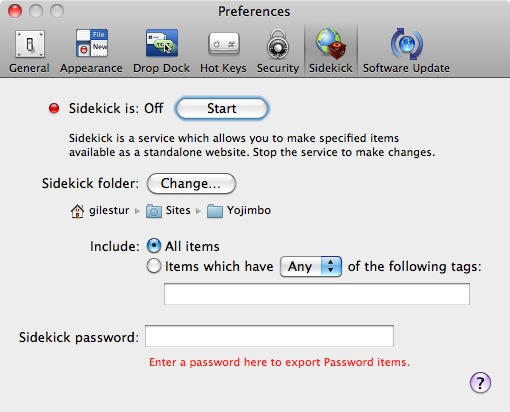Information management application Yojimbo was updated today, and version 2.2 adds an interesting new feature called “Sidekick”.
Sidekick creates a kind of “Yojimbo-to-go” export of all your notes (or a subset of them if you prefer). This is done by turning the notes into a self-contained mini website that you can put anywhere on your Mac or your network.
This website has a simple structure: each note is a page, and they are all indexed on a single searchable index page (which, as luck would have it, looks very nice on an iPhone).
It’s read-only, so you can’t hack edits to the exported web pages in order to update Yojimbo remotely. But it is updated in real time – make changes to your Yojimbo database and they will automatically be mirrored to the Sidekick version.
So, what can you do with this? Let’s start with something you can’t do with it: use it with Dropbox and still view your archive using Dropbox’s web interface. (This breaks because of the way Dropbox is set up. But it can be used to sync a Yojimbo Sidekick website across different Macs, if that’s something you want to do.)
What I find most interesting about Sidekick is the way everything’s exported into a single folder, making it easy to copy or sync your data to pretty much any device that runs a moderately up-to-date browser. For example, if you want to get your Yojimbo notes on to a Windows or Linux netbook, you can.
I spoke to Rich Siegel of Bare Bones Software, and he said there was no reason why you couldn’t store your Sidekick archive anywhere on your local network. So if you have a machine that’s permanently online and has a dedicated IP address, you could keep it there and always have your notes available across the net.
And there are many other options and possibilities to consider. You could keep Sidekick in a local folder, but have a service, a Folder Action, or an rsync command that regularly uploads it to your webhost.
Then there’s your iPhone and iPad. Those devices can browse to your Sidekick wherever you keep it, and Siegel said he’d seen some cases where the entire archive got locally cached on the device, meaning a network connection wasn’t necessary. But this doesn’t work all the time, or reliably, so it’s not an official option yet.
Talking of iPads, though, Rich was keen to point out how well the iPad was suited to running a mobile version of Yojimbo – something fans of the app have been clamouring for since forever. He hinted that some sort of mobile Yojimbo could be available for iPad in the coming months.
If you can’t wait that long, and if Sidekick doesn’t quite do it for you, there are hacks for getting Yojimbo to store its data on Dropbox; but they won’t come with Sidekick’s nifty search, and aren’t nearly as simple to activate.
Over to you and your ideas, then: what ingenious places can you think of to store the Sidekick archive in, to maximise its use elsewhere? Share your bright ideas in the comments.


